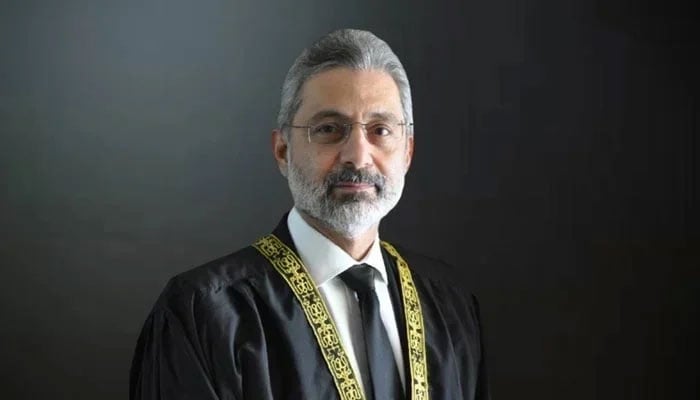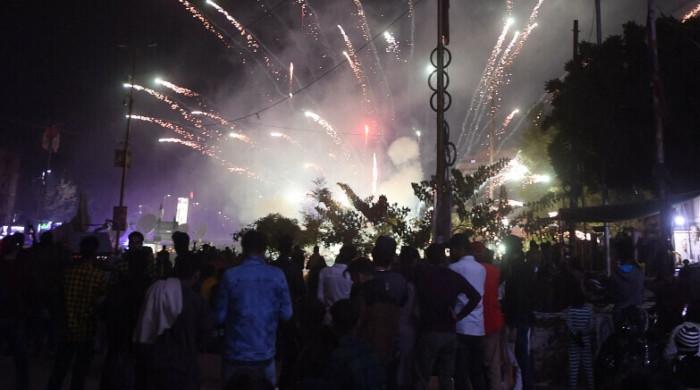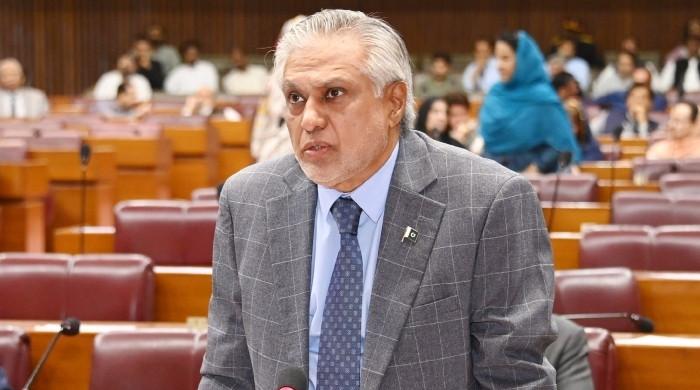Justice Isa says six-bench verdict cannot set aside order on suo motu
"Decisions emanating from a courtroom overcast with the shadow of autocracy cannot displace Constitution," says Justice Isa
April 08, 2023

- Six judges were assembled in a hurry, says Justice Isa
- He says the constitution of the bench was against the rules.
- Irreparable damage will be caused to the judiciary if its credibility is undermined, he states.
ISLAMABAD: As the crisis in the Supreme Court deepens, Justice Qazi Faez Isa has said that the verdict of a six-member bench of the top court could not set aside an earlier order to halt suo motu proceedings.
A six-member bench last week — after a five-minute hearing — 'closed' the case that led Justice Isa to issue an order to freeze the hearings of all the sub judice suo motu notices.
The apex court had constituted the six-member larger bench to review the decision of a special SC bench, led by Justice Isa, which ordered the shelving of all suo motu cases — invoked under Article 184(3) of the Constitution.
Justice Isa, while hearing a case examining the grant of additional 20 marks to Hafiz-e-Quran pre-medical candidates for admission into MBBS/BDS courses, had ordered the postponement of cases being heard under Article 184(3) of the Constitution till amendments were made to the Supreme Court Rules 1980 regarding the discretionary powers of the chief justice of Pakistan to form benches.
The new bench — which disregarded Justice Isa's order — was headed by Justice Ijazul Ahsan and comprised Justice Munib Akhtar, Justice Sayyed Mazahar Ali Akbar Naqvi, Justice Muhammad Ali Mazhar, Justice Ayesha A Malik, and Justice Syed Hasan Azhar Rizvi.
But in his note today issued in the suo motu case, Justice Isa noted that the constitution of the bench was against the rules and it could not disregard his bench's majority order.
"Since the gathering in a court of six distinguished judges was not permissible under the Constitution or under any law, the Supreme Court’s order dated 29 March 2023 passed in Case No. 4 could not have been set aside by the 4 April Note," the judge said.
"Decisions emanating from a courtroom overcast with the shadow of autocracy cannot displace the Constitution," the senior puisne judge added.
In its order, the senior puisne judge said: “The Constitution does not confer jurisdiction on a bench or on judges of the SC (no matter how many in number) to sit in appeal over an order of the SC.”
He maintained that the “so-called” larger bench was wrongly constituted purportedly to hear case no. 4 (the suo motu case).
“The larger bench did not constitute a (constitutional) court; it did not possess any of the abovementioned jurisdictions, and could not pass an order.
"The purported ‘order’ dated 4 April 2023 cannot be categorised as an order of the SC; it is of no constitutional or legal effect. It would be legally incorrect to refer to it as an order; therefore, it shall be referred to as the 4 April Note,” the judge stated.
In his order, the senior puisne judge asserted that if the “review jurisdiction was to be invoked then Case No. 4 would have to be listed for hearing before the same judges who had earlier heard it on 15 March 2023, but this was not done.”
He also pointed out that the six judges were assembled in a hurry and that they concluded the matter within a few minutes.
“If the matter had been listed for hearing in the ordinary course as per normal procedure, sufficient notice had been given, and it was properly deliberated upon, then the four Hon’ble junior Judges may have realised that what their seniors were doing did not accord with the Constitution and the law,” Justice Isa wrote.
The SC judge also noted that the CJP has been designated as the ‘Master of Rolls’, which he mentioned was a term not found in the Constitution, in any law or even in the Supreme Court Rules, 1980.
“The stated rule of law was not enacted pursuant to a law nor can it by its own self-serve itself to be categorised as rule of law, particularly when it contravenes the Constitution, which does not grant to the Chief Justice such powers,” the judge mentioned.
Justice Isa also stated that “irreparable damage will be caused to the Judiciary and to the people of Pakistan if the legitimacy, integrity and credibility of the Judiciary is undermined because without it the people (who it serves) will lose their trust.”









